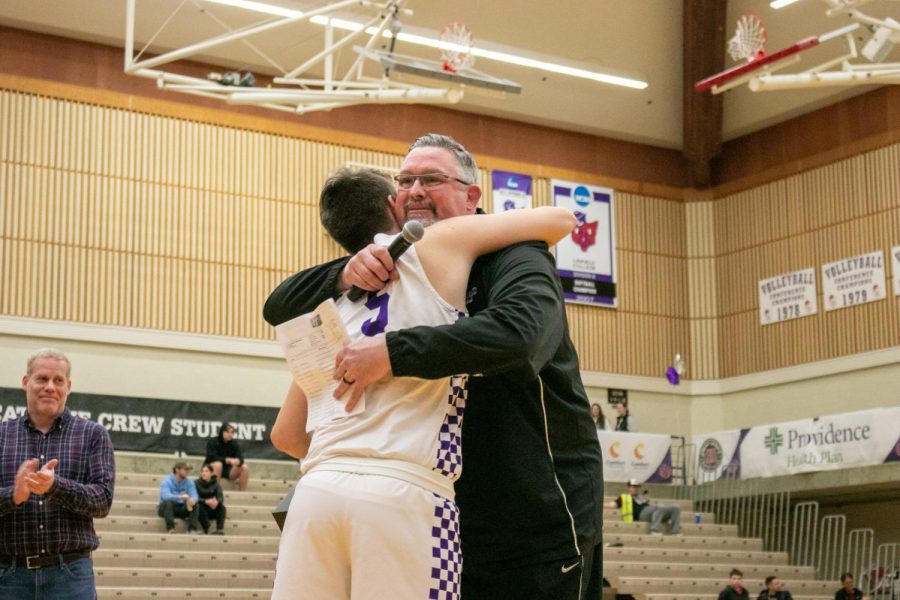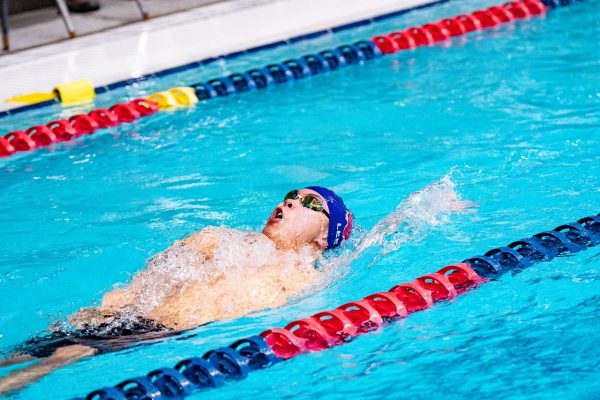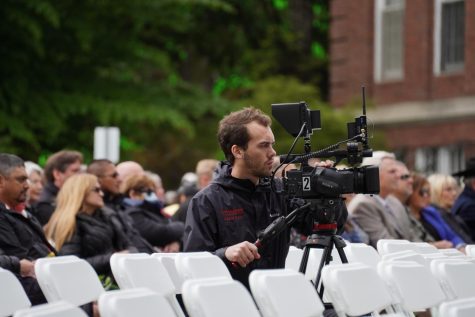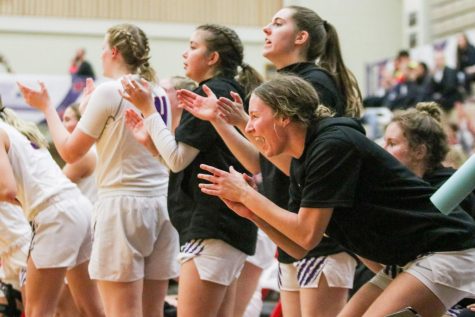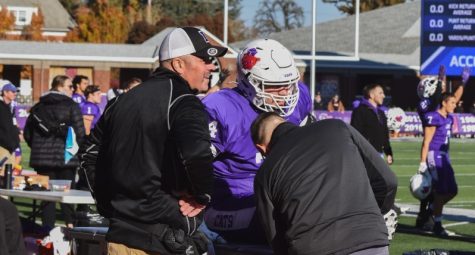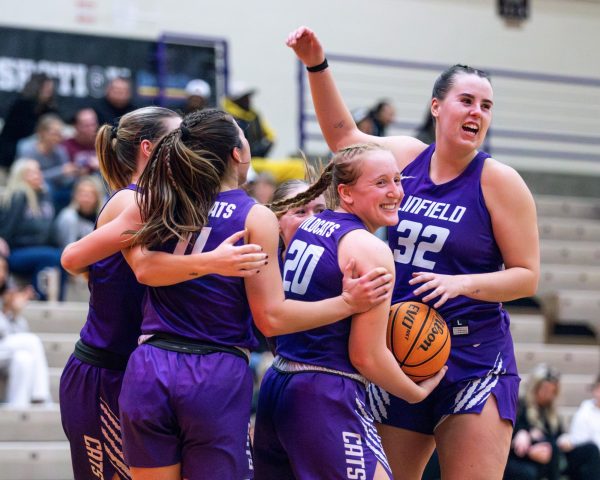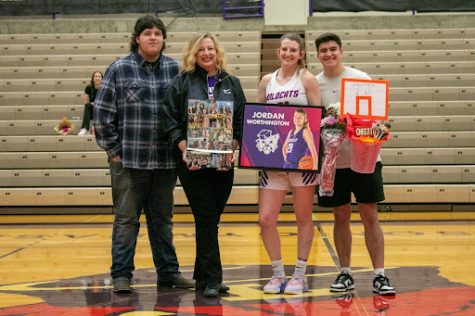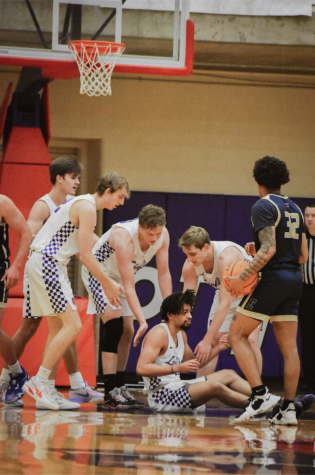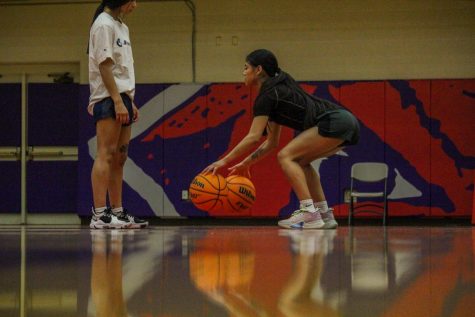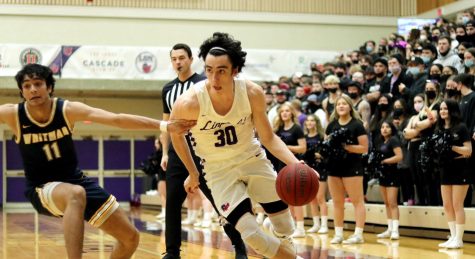Coach Rosenberg suspended after altercation during season finale
Rosenburg hugs one of the seniors during their senior night against Lewis and Clark
It’s been just over a week since Linfield University men’s basketball head coach Shanan Rosenberg was suspended from the program due to an alleged verbal altercation with a Linfield parent during the team’s final game of the season.
With less than a minute to play against Whitman University and trailing by 16 points, the Linfield men’s basketball team knew their season was over, as they would have needed to come away with the victory in order to earn a spot in the Northwest Conference Tournament. As the clock winded down on February 18 in Walla Walla, Wash., the Linfield seniors knew it was their last time playing in a Wildcat jersey and their last time playing for Coach Rosenberg.
Whitman was celebrating their seniors at this game, as it was their designated senior night and final home game of the regular season. With under a minute remaining, Whitman had the win secured (79-65). John Lamanna—the men’s basketball head coach for Whitman—called two timeouts. The first was to sub in the seniors, and the second was to sub them out one final time at home as a way to recognize them.
Linfield had done the same in their home game against Lewis and Clark College the previous weekend.
When Whitman put their seniors in during that final minute of play, a Linfield parent began yelling at Rosenberg, telling him to put the seniors in. This comment resulted in Rosenberg turning to the stands and responding.
“I was on the bench. I’d just got subbed out probably a minute beforehand,” said Reece Gibb, a senior on the team. “And a parent screamed out to put the seniors in. Some people might think that’s the right thing to do. Coach kind of took offense to that.”
Rosenberg is 6-foot-9 with a booming voice. A parent in attendance estimated that there were about 40 fans in attendance at the game, not including parents, so Rosenberg filled the gym with a commanding presence.
“He basically said, ‘Hey, if you want to talk to me about that, talk to me after the game, come talk to me after the game about that,’” Gibb said. “Some people I guess took it as a little more threatening and aggressive. I took it more as like, ‘Really, man, don’t say that to me in the middle of a game.’ I really don’t think Coach Rose truly meant that.”
This conversation between the coach and the parent did not stop the game, and the officials did not get involved. After the frustrating loss, the players and coaches went through their normal post-game ritual, expecting to return to campus like usual and resume classes the following week.
“[Coach Rose had] honored seniors in more ways than he even needed to, so I can understand where he took a little offense to someone saying that,” Gibb said. “After the game, things were deescalated. All was good. It just all calmed down and there was no real worry. We moved on, then we went out, hugged our parents and did all that.”
However, to the players’ surprise, they received a message early the next week indicating that their coach had been suspended and was not allowed to speak with them. Both the players and the parents immediately reached out to the Linfield athletic director Garry Killgore and the university president, Miles Davis. Neither of them responded. One parent of a player expressed that they left six voicemails and four emails combined with the president’s office and the athletic director’s office.
“We just kind of felt like we were left in the dark,” Gibb said. “We didn’t really know what to do with that information and where to go with that information, and so we just kind of were waiting for answers. All of us had to kind of come together and realize, like, ‘Hey, if this is any worse than a suspension, we have to be there for Coach Rose’s back.’ And when I say all of us, I truly mean every single player on our team.”
It took a week from when the incident occurred for parents and players to get in contact with members of the university. The athletic director did not initially reach out to the student-athletes to explain the situation. But many parents and players believe they should have been contacted by the athletic department and the university immediately after the suspension and had the situation explained to them instead of attempting to put the pieces together on their own.
“Parents for one week, Monday through Thursday, are emailing and calling the president, emailing and calling Garry. No response,” a parent of a senior said. “None whatsoever. We knew the coach was going on Friday, so a bunch of [parents] said, ‘Let’s go down. Let’s go to Linfield and let’s hand-deliver Garry and human resources and the president all these letters of support, and let’s get as many players as we can to go with us and try to get some answers.”
On Friday, February 24, Rosenberg was called into Killgore’s office. Killgore met with him for 10 minutes and gave Rosenberg 21 days to decide on a proposed severance agreement or otherwise be let go immediately. Rosenberg took the 21-day agreement and obtained legal counsel.
It is the above-quoted parent’s understanding that the university did not investigate the altercation at the game and did not interview players or fans in attendance from either Linfield or Whitman.
A parent of a senior joined Rosenberg in the meeting with Killgore, and he, along with two other parents and 10 players, attempted to speak with Killgore. Yet instead of speaking with the student-athletes and parents, Killgore chose to call two Linfield public safety officers and requested that they follow the group of players and parents as they traveled across campus to speak with Davis.
The public safety officers were told to follow the group but were not told why. The group of players and parents did not demonstrate any harmful behavior and said that they were merely trying to be heard. While the parents of the athletes were upset about the suspension of Rosenberg, they were more dismayed with how the athletic department and the administration handled the situation.
Many of Rosenberg’s players—past and present—say that the coach was like a father to them. They looked up to him. They trusted him. Both the athletes and the parents felt as though Killgore needed to reach out to the team and explain the situation instead of staying silent and allowing the players to find out the news through a parent’s text message.
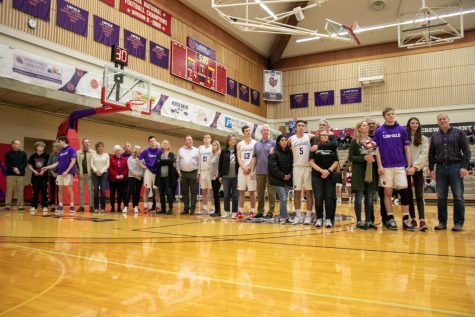
Alum Ryan Cali started his basketball journey as a player under Rosenberg at Foothill College, a junior college in Los Altos Hills, Calif., and then followed Rosenberg to Linfield for his final two years of eligibility. After graduating, Cali joined Rosenberg as an assistant coach for three years, spending a total of seven years on the court with Rosenberg.
“All of us that were coming through the basketball program I’m sure chose Linfield not only for the school, but mainly to play basketball,” Cali said. “Our experience at Linfield was a byproduct of going to play basketball first and then everything that transpired afterwards—the academics, the friendships, the social life…all of that blossomed because of our desire to come play basketball at the school.”
Many generations of the Linfield basketball program—players, parents and coaches—showed their support for Rosenberg through posting pro-Rosenberg messages on social media and by hand-delivering nearly 50 letters to the president’s office.
“I know that a lot of former players are very upset at the fact that they don’t feel like the school has supported the basketball program,” Cali said. “They don’t feel like the school has supported Coach Rose. Obviously that’s going to leave a sour taste in all of our mouths because at the end of the day, we’re riding for Coach Rose.”
Davis and Killgore met with the team on March 1. They met for 30 minutes, during the week in the middle of the day, which meant that many of the student-athletes had to miss class to attend the meeting. President Davis spoke for 22 minutes, primarily sharing personal stories. Killgore did not contribute to the meeting, and the players were given eight minutes to voice their opinions, concerns and feelings.
According to Linfield Chief Marketing Officer and Associate Vice President for Strategic Communication Scott Nelson, an alleged video showing the interaction between Rosenberg and the parent was recorded by a fan at the February 18 game.
On behalf of Nelson, Linfield Media and Public Relations Manager, Kelly Williams Brown, shared Nelson’s quote, which was stated in the Oregonian, regarding the fan-recorded video.
“Not all of the audio is intelligible,” Nelson said, according to the Oregonian article. “At one point, however, Coach Rosenberg is gesturing angrily into the crowd and yells, ‘Come outside after the game, sir. Let’s have some words then.’ One of his players puts a hand on the coach’s arm, apparently attempting to defuse the situation.”
When referring to the support Rosenberg has received from many within the basketball program, as well as the concerns others shared about his demeanor and actions throughout his 10 years as the Linfield head coach, Nelson had a few words to share on the subject.
“No single incident or message will necessarily determine whether the athletic department decides to keep a coach after the season concludes,” Nelson said.
Individuals with an understanding of the history between Rosenberg and the administration have voiced that the suspension is bigger than the incident at the February 18 game and that it is actually the culmination of an ongoing personal disagreement between the two parties.
Student-athletes such as Gibb came to the university because of Rosenberg. As a Division III school, the players chose the school for the atmosphere and the experience, not an athletic scholarship.
“[Linfield is] a great place to go to school,” one senior parent said. “My son loves his professors there at Linfield, had a good experience, but he went there because of Coach Rose. I got to believe most athletes are recruited by a coach, and they go there because they have a relationship. This isn’t Division one. Division three relationships between players and coaches are a lot different than a Division one. For that reason, it’s really important to understand if you’re gonna get rid of a coach, then make sure it’s for the right reasons.”
However, in the 30-minute meeting with Davis, the president told the student-athletes that no one ever goes to a university for a coach; they go there because of the university. However, the reason Cali—and many basketball players who played for Rosenberg—came to Linfield was because they wanted to play for Rosenberg. He just happened to be the coach at Linfield.
“It’s not just the winning that’s so amazing, it’s [Rosenberg’s] values and the way he prepares young men for adulthood and life,” said Jack Stallard, a senior on the team. “I would never trade that for anything. I could lose every single game for the last four years and I would still come back here because I’m such a better person because of what Rose taught me.”
While the 2022–23 season was a rebuilding year for the Linfield men’s basketball team after losing their top three scorers from the previous year, Rosenberg had turned the program around in his 10 years as head coach and had led the Wildcats to two conference titles during the 2019–20 and 2021–22 seasons.
The destiny of the Linfield men’s basketball program is unknown, and the future status of Rosenberg’s position with the athletic department will remain undecided until March 17, when the 21-day period expires.
“It’s frustrating because we usually have a team banquet, every year Coach takes the seniors out for a steak dinner after the season, so we can’t have either of those,” Stallard said. “If Garry had said ‘Hey, basketball team, we’re meeting Monday. You can miss class for this. We’re putting Rose on suspension because of not just this reason but for the accumulation of certain events,’ or whatever it is. He’s still a person in the community that I feel like if I’m walking down the street I’m going to want to say hi.”

